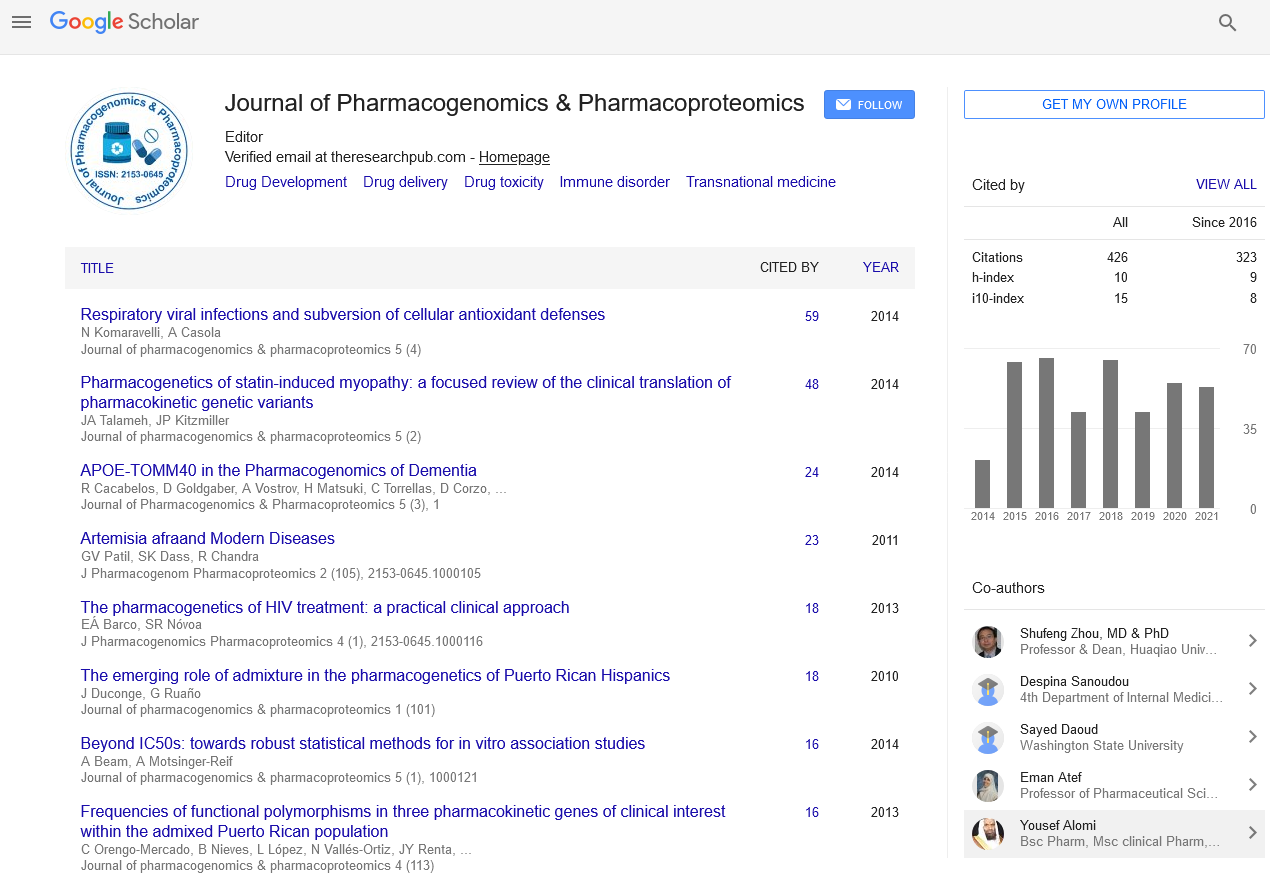Indexed In
- Open J Gate
- Genamics JournalSeek
- Academic Keys
- JournalTOCs
- ResearchBible
- Electronic Journals Library
- RefSeek
- Hamdard University
- EBSCO A-Z
- OCLC- WorldCat
- Proquest Summons
- SWB online catalog
- Virtual Library of Biology (vifabio)
- Publons
- MIAR
- Euro Pub
- Google Scholar
Useful Links
Share This Page
Journal Flyer

Open Access Journals
- Agri and Aquaculture
- Biochemistry
- Bioinformatics & Systems Biology
- Business & Management
- Chemistry
- Clinical Sciences
- Engineering
- Food & Nutrition
- General Science
- Genetics & Molecular Biology
- Immunology & Microbiology
- Medical Sciences
- Neuroscience & Psychology
- Nursing & Health Care
- Pharmaceutical Sciences
Risk factors of Nevirapine hypersensitivity reaction among HIV-1 infected treatment naïve patients at Korle-Bu Teaching Hospital
5th International Conference on Predictive, Preventive and Personalized Medicine & Molecular Diagnostics
December 01-02, 2016 Valencia, Spain
Elvis Twumasi Aboagye
University of Ghana, Ghana
Scientific Tracks Abstracts: J Pharmacogenomics Pharmacoproteomics
Abstract:
Purpose: Many African countries, still carries the burden of communicable and non-communicable diseases. Introduction of antiretroviral drugs in Ghana has improved HIV patient survival. Nevirapine a frontline medication according to National Guidelines for Ghana leads to hypersensitivity reaction in some patients. This study examines the clinical risk factors and specific genotypic alleles that are associated with nevirapine hypersensitivity reaction. Methods: Antiretroviral naïve HIV patients who were initiating nevirapine-based HAART therapy were enrolled and clinically monitored in a nested case-control study over six months. Blood samples were collected for aminotransferase assay and DNA genotyping for specific MDR1 and CYP2B6 markers. Results: 11 (15.7%) were identified as cases and 59 (84.3%) comparisons at the end of the 24 weeks monitoring out of the study population. 8 out of the observed cases were categorized as nevirapine hypersensitivity rash and 4 as hepatotoxicity. The concentration of AST was much higher in the cases (119.44±155.86) compared to the comparisons group (68.80±42.65), p=0.056. Concentration of ALT was also higher in the cases (136.44±165.99) compared to the control (56.72±33.02) p=0.003. The CYP2B6 516 G>T, variant allele frequency observed in the study was 62 (44.3%). However, there was no variant allele detected for the three SNPs in ABCB1 gene genotyped. Conclusion: The observed NVP HSR outcome is a clear manifestation of the adverse reaction among HIV-1 infected Ghanaian population. The effect of this outcome although not statistically significant, contributes clinically to non-adherence and hospitalization of patients which seems to be a major factor to treatment failure in resource limited countries.
Biography :
Elvis Twumasi Aboaye has completed his MPhil in Medical Biochemistry from the University of Ghana and is a young Biomedical Scientist. He is the Research Officer at Life Medical Mission. He is involved in research at the Centre for Tropical Clinical Pharmacology and Therapeutics (CTCPT), School of Medicine and Dentistry, University of Ghana.
Email: atelvis45@gmail.com


